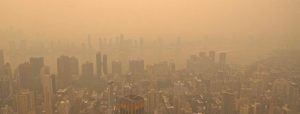National Pollution Control Day is an annual
event observed on December 2 to remember the people who lost their lives in the
1984 Bhopal gas tragedy. It is also the day to raise awareness about how air
pollution affects us and how it increases the risk of respiratory disorders,
lung cancer, brain or kidney damage and heart disease in long run.
Eating certain foods can help us reduce the
risks of air pollution.
Also Read: Children going to school while elders WFH: Supreme court slams Delhi government on air pollution
Here are some foods you could consume to
fight air pollution and smog which are prevalent in the winter season,
especially in the northern parts of the country.
Vitamin A: Carrots, kale, candy potatoes and apricots are packed with Vitamin A, which is the fat-soluble nutrient. It is the second most important nutrient needed for better lung health. This nutrient is important for boosting immunity, which helps in regenerating cells in the body. So by increasing vitamin A intake, you can initiate the natural repair process of lung tissue.
Vitamin C: Vitamin C improves immunity and
in doing so it reduces the consequences of air pollution in our body. Fruits
like oranges, strawberries, apples, watermelons reduce inflammatory allergy.
Apart from fruits, vegetables like red bell peppers, kale, parsley, broccoli,
cauliflower and spinach are also good sources of Vitamin C.
Also Read: Surgical, cloth, or N95: How to mask up against air pollution?
Vitamin D: Apart from strengthening bones, Vitamin D also protects you against respiratory infection and may reduce the risk of Chronic obstructive pulmonary disease (COPD) flare-ups. As per a study, low levels of vitamin D can increase the risk of wheezing, bronchitis, asthma and other respiratory problems. Increasing the intake of this nutrient can improve lung functions. Tuna, salmon, sardines, oysters and egg yolks are naturally high in vitamin D.
Also Read: Air pollution: 5 tips for asthma patients
Vitamin E: Olive oil, sunflower seeds,
almonds, hazelnuts and avocado are packed with vitamin E, which is air
pollution resistant and clean up our lungs.
Omega fatty acids: Foods containing
omega-fatty acids can decrease air pollution-related irritation and even reduce
oxidative stress, various researches established this fact. Walnuts, flaxseeds,
chia seeds, and salmon fish are sources of fatty acids.







